Global Minds, Connected Teams: How Cultural Conversation Cards Bridge Divides and Foster Collaboration
In today's interconnected world, organizations and educational institutions face a common challenge: bringing together people from diverse cultural backgrounds and helping them collaborate effectively. Traditional team-building exercises often fall short in addressing the nuanced needs of global teams. This is where cultural conversation cards emerge as a powerful solution. These carefully designed tools go beyond simple icebreakers, providing structured pathways to deeper understanding, enhanced cultural intelligence, and genuine connection among team members and students across the globe.
- Chapter 1: The New Global Landscape - Why Cultural Intelligence Matters
- Chapter 2: How Cultural Conversation Cards Transform Team Dynamics
- Chapter 3: Corporate Applications - Case Studies and Best Practices
- Chapter 4: Educational Applications - Preparing Global Citizens
- Chapter 5: Implementation Framework - Getting Started
- Chapter 6: Advanced Applications and Future Directions
- Conclusion: Building Bridges in a Connected World
Chapter 1: The New Global Landscape - Why Cultural Intelligence Matters
Understanding the critical need for tools that bridge cultural divides in modern organizations and classrooms.
The Limitations of Traditional Approaches
-
Standard team-building activities often assume cultural homogeneity
-
Standardized training programs frequently fail to address individual cultural perspectives
-
Standard communication methods overlook deeply ingrained cultural differences
The Business Case for Cultural Intelligence
Organizations with high cultural intelligence consistently demonstrate:
-
30% higher performance in multicultural projects
-
45% improved retention in diverse teams
-
60% greater innovation in problem-solving approaches
The Educational Imperative
Classrooms preparing students for global careers require tools that:
-
Develop empathy and cross-cultural understanding
-
Create safe spaces for discussing cultural differences
-
Build practical communication skills for international environments
-
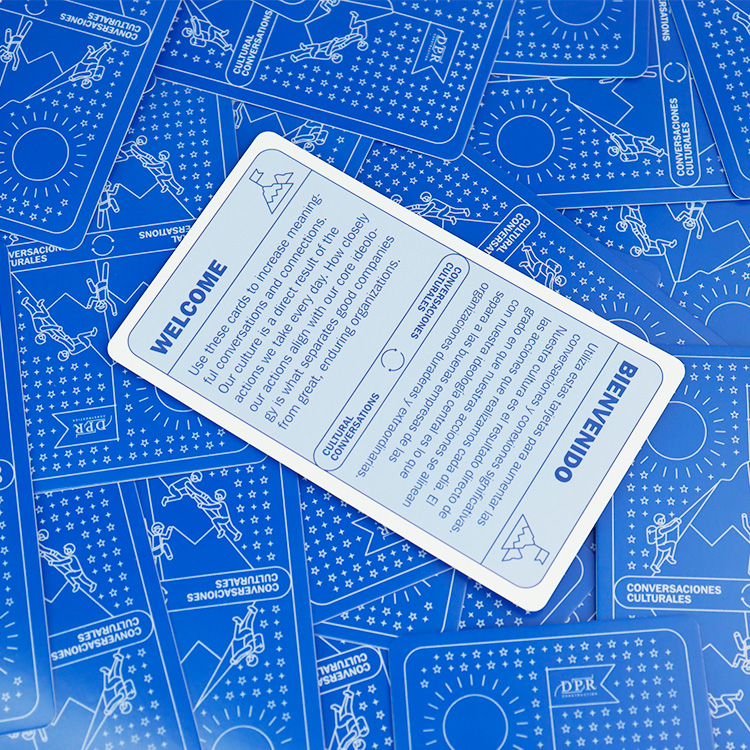
Chapter 2: How Cultural Conversation Cards Transform Team Dynamics
Exploring the mechanics behind these powerful tools and their impact on group cohesion.
Structured Yet Flexible Framework
Cultural conversation cards provide guided discussions that feel organic rather than forced. Each card presents:
-
Thought-provoking questions about values and perspectives
-
Real-world scenarios requiring cultural interpretation
-
Personal reflection prompts that encourage vulnerability
-
Problem-solving challenges that require collaborative thinking
Building Psychological Safety
The card-based format creates equal participation opportunities by:
-
Ensuring everyone has a voice in the conversation
-
Removing the pressure of initiating difficult topics
-
Providing clear boundaries for respectful discussion
-
Creating natural turn-taking structures
Measurable Impact on Team Performance
Teams using cultural conversation cards regularly report:
-
40% improvement in meeting effectiveness
-
35% reduction in cross-cultural misunderstandings
-
50% increase in collaborative problem-solving
-
Significant improvement in team trust metrics
-
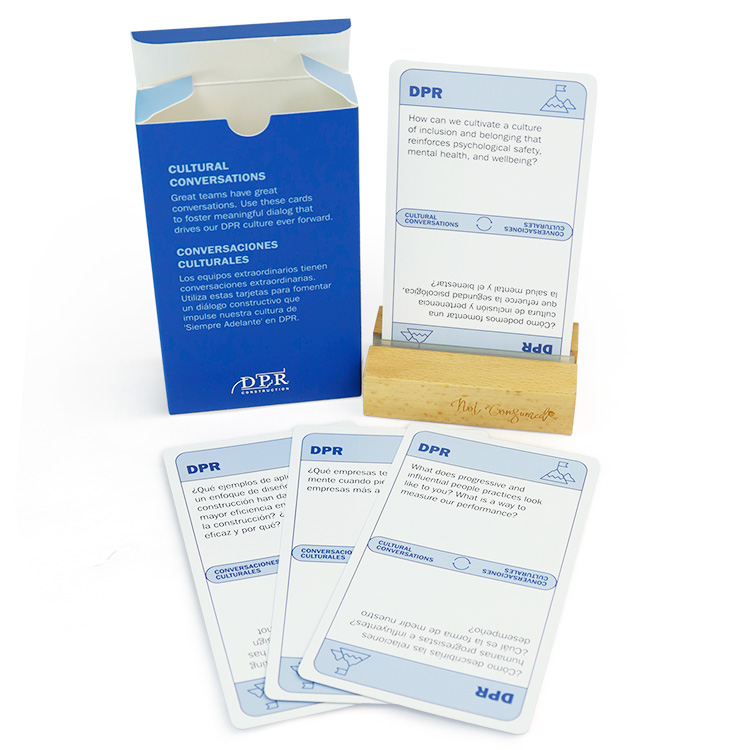
Chapter 3: Corporate Applications - Case Studies and Best Practices
Real-world examples of organizations leveraging cultural conversation cards for tangible results.
Multinational Technology Company: Breaking Down Silos
A leading tech company implemented cultural conversation cards across their 15 international offices. The results after six months included:
-
30% increase in cross-departmental collaboration
-
25% faster project completion times
-
Marked improvement in employee satisfaction scores
-
Enhanced innovation in product development
Implementation Strategy:
-
Weekly guided sessions using cultural conversation cards
-
Trained facilitators from within teams
-
Integration with existing leadership development programs
-
Regular assessment of team cohesion metrics
HR Manager Perspective
"Our global teams were struggling with unspoken cultural tensions that affected productivity. The cultural conversation cards provided a safe, structured way to address these issues directly. The improvement in communication and trust has been remarkable."
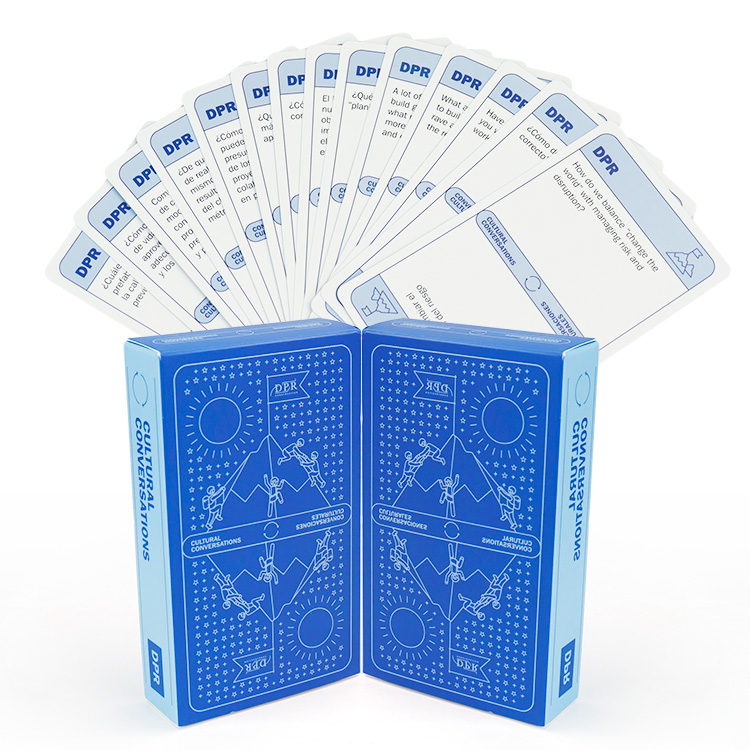
Chapter 4: Educational Applications - Preparing Global Citizens
How educators are using conversation cards to create more inclusive, effective learning environments.
University International Program Success
A prominent business school integrated cultural conversation cards into their international student orientation, resulting in:
-
Faster integration of exchange students
-
Improved cross-cultural group project outcomes
-
Enhanced classroom participation from international students
-
Stronger global alumni networks
Classroom Implementation Models
-
Language Learning: Cards prompt discussions about cultural nuances in communication
-
Business Classes: Scenarios explore different approaches to negotiation and leadership
-
Social Sciences: Discussions examine cultural perspectives on global issues
-
Student Services: Support for international student adjustment and success
Educator Testimonial
"The cultural conversation cards have transformed how my students engage with each other. They're learning to appreciate different perspectives while developing crucial communication skills for their future global careers."
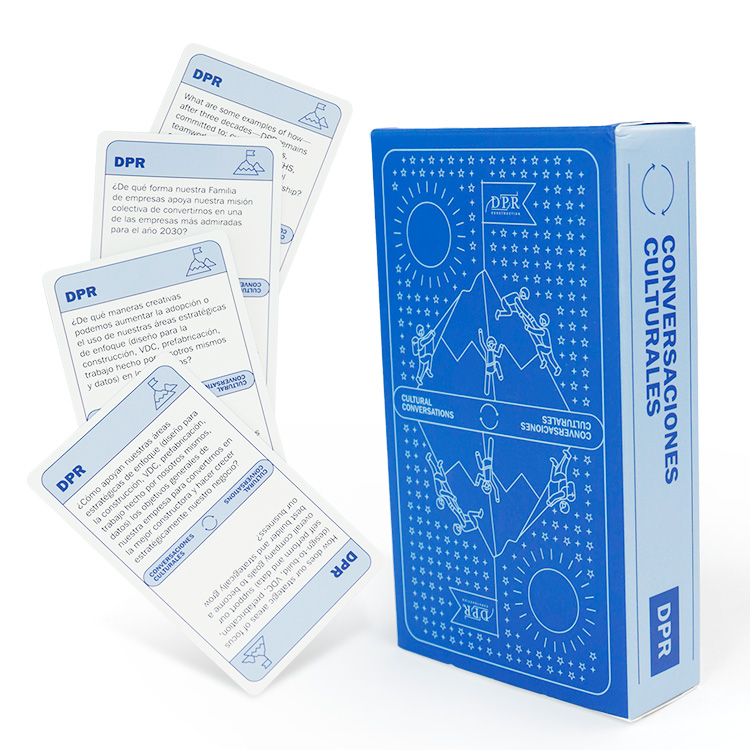
Chapter 5: Implementation Framework - Getting Started
Practical guidance for integrating cultural conversation cards into your organization or classroom.
Assessment and Planning
-
Identify specific cultural intelligence challenges
-
Set clear objectives for implementation
-
Choose appropriate card sets for your context
-
Plan facilitation training and support
Program Rollout Strategies
-
Start with pilot groups to build success stories
-
Train internal facilitators for sustainability
-
Create regular, consistent session schedules
-
Establish feedback mechanisms for continuous improvement
Measuring Success and ROI
Key metrics to track:
-
Team cohesion and trust measures
-
Cross-cultural project success rates
-
Employee/student satisfaction scores
-
Innovation and collaboration metrics
-
Retention and engagement statistics
-
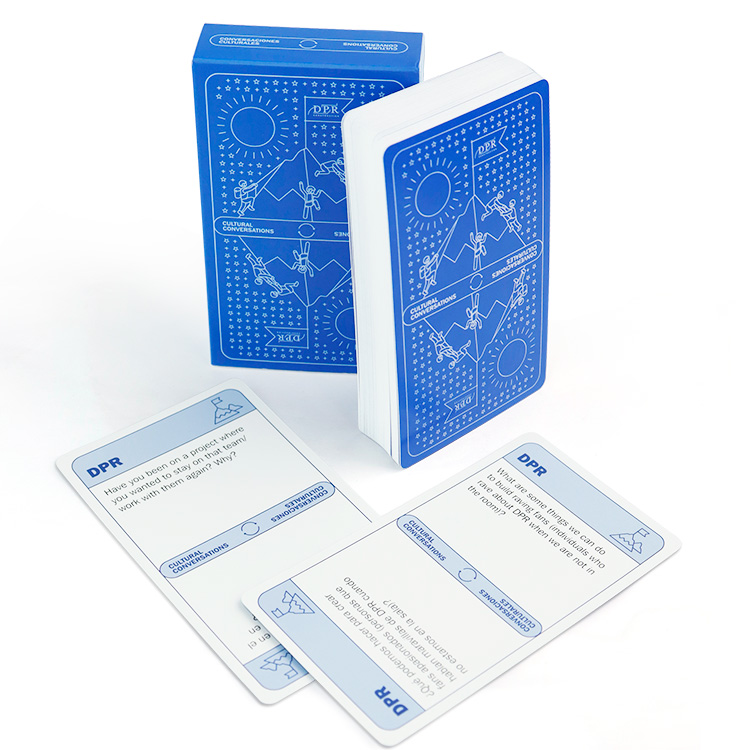
Chapter 6: Advanced Applications and Future Directions
Innovative ways organizations are expanding their use of cultural conversation tools.
Leadership Development Integration
-
Cultural awareness training for global managers
-
Cross-cultural negotiation skill development
-
Inclusive leadership practice scenarios
-
Global team management simulations
Digital Transformation
-
Hybrid meeting facilitation tools
-
Virtual team integration programs
-
Global onboarding enhancements
-
Remote collaboration improvement
Research and Development
Ongoing studies are exploring:
-
Long-term impact on organizational culture
-
Applications in conflict resolution
-
Adaptations for specific industries
-
Integration with AI and digital learning platforms
-
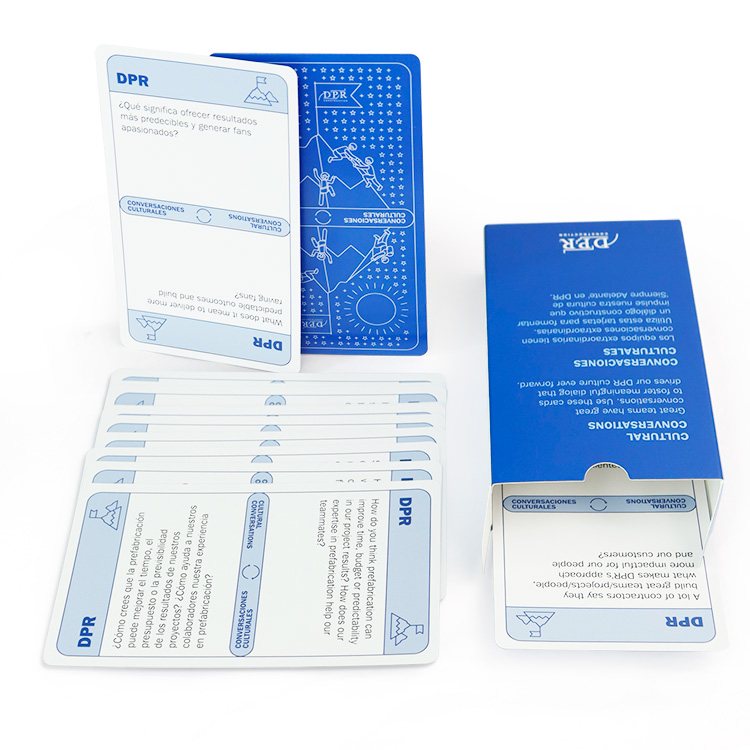
Conclusion: Building Bridges in a Connected World
The challenges of global collaboration are complex, but the solution can be elegantly simple. Cultural conversation cards represent more than just another training tool—they embody a fundamental shift in how we approach cross-cultural relationships. By creating spaces for authentic dialogue and mutual understanding, these cards help build the cultural intelligence that organizations and educational institutions need to thrive in our interconnected world.
The true power of cultural conversation cards lies in their ability to transform abstract concepts of diversity and inclusion into practical, daily behaviors that strengthen relationships and enhance collaboration. Whether in corporate boardrooms or university classrooms, these tools are proving essential for developing the global minds and connected teams that will shape our collective future.
As we move forward in an increasingly globalized world, the organizations and institutions that invest in building cultural intelligence today will be the leaders of tomorrow. The journey toward genuine global connection begins with a simple conversation—and sometimes, all you need is the right card to get started.

How to Create Your Own Custom Playing Cards: A Step-by-Step Design Tutorial (2026 Edition)

Beyond KEM: The 10 Best Professional Poker Card Brands You Didn't Know About (2026 Edition)

Custom Design Playing Cards: The Ultimate 2026 Guide to Manufacturing and Artistry

Double the Impact: The Substantial Two-Deck Custom Playing Card Gift That Demands Attention

The Ultimate Guide to Custom Playing Card Printing in 2026: Professional Techniques & Design
About customized services
Can I customize the design of my cards?
Absolutely! We offer full customization options, from card design and size to finishes and packaging. Our design team is ready to collaborate with you to create the perfect look.
What is the minimum order quantity?
We do not have a strict minimum order quantity. Since we are a custom offset printing company, we recommend a minimum order of 500 sets, as the material costs are the same, but the printing setup costs are higher.
However, if your order quantity is less than 300 sets, our sales team will usually work with customers to help customers find the most competitive options.
What is the minimum order quantity for Private Label projects?
Our minimum order quantity usually starts at 500 pairs. However, we can handle smaller orders depending on the specific project requirements.
About logistics
Can you handle shipping and fulfillment?
Yes! We offer comprehensive fulfillment services, including storage, packing, and shipping. You can rely on us to ensure your cards reach their destination safely and on time.
About cooperation process
Do you accept international orders?
Yes, we accept orders from around the world! Shipping costs and delivery times may vary, so please contact us for specific details related to your location.





WE’D LOVE TO 
FROM YOU
Please send us your inquiry details; our team will contact you ASAP.
20+ years of experience in custom playing cards, game cards, tarot cards, flashcards, and board games, as well as paper and paperboard box manufacturing.


bbilaser
sq_AL